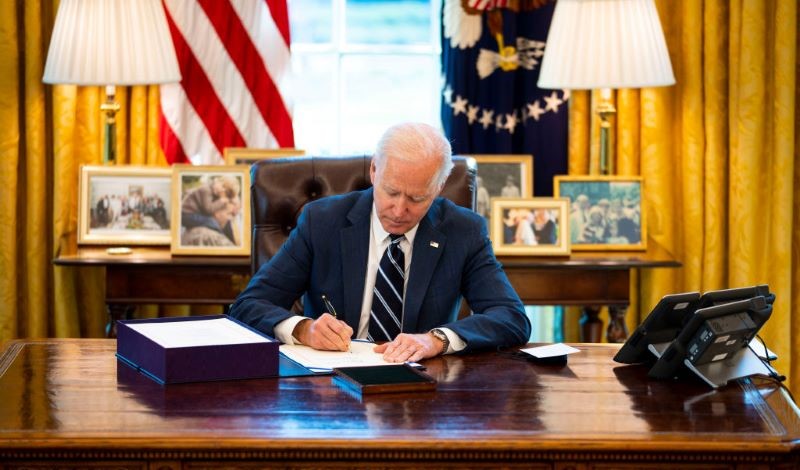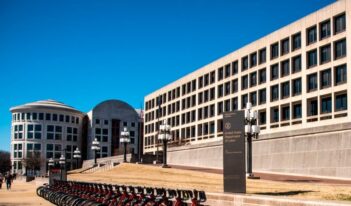
The President’s veto keeps in place a retirement investment rule allowing fiduciaries to consider ESG factors.
More than two years into his presidency, President Joseph R. Biden issued his first veto on a resolution to overturn a retirement investment rule. The rule allows investment decision-makers to consider environmental, social, and governance (ESG) factors when selecting investments.
In January, the U.S. Department of Labor amended its regulations under the Employee Retirement Security Act of 1975 (ERISA) to permit—but not require—investment decision-makers to consider ESG factors when selecting 401(k) investment options. The Labor Department had previously proposed the new rule in November in response to an executive order directing federal agencies to review and amend regulations in conflict with environmental protection and public health.
Under ERISA, investment decision-makers—also known as fiduciaries—must act prudently and for the exclusive benefit of plan participants and beneficiaries. Prior to the new rule, ERISA regulations required fiduciaries to select investments solely based on financial considerations such as risk-adjusted capital ratio, which measures an institution’s ability to weather economic downturn. The new rule, however, now includes a provision clarifying that fiduciaries may account for participants’ ESG preferences when constructing a roster of prudent investment options.
In an attempt to nullify the new rule, Congress passed a joint resolution of disapproval under the Congressional Review Act (CRA). The CRA establishes a review period during which Congress may submit a resolution to overturn a new federal agency rule and prevent the issuing agency from creating a similar rule in the future. To invalidate the regulation, the sitting president must sign the CRA resolution or Congress must pass the resolution over the president’s veto by two thirds of both houses.
In his veto message, President Biden stated that “retirement plan fiduciaries should be able to consider any factor that maximizes financial returns…that’s not controversial—that’s common sense.”
But not everyone agrees.
Both the congressional resolution and the presidential veto represent a contentious battle between Republicans who view ESG investing as harmful to retirees’ bottom lines and Democrats who argue that it helps both investors and society.
Republican supporters of the resolution argued that the consideration of ESG factors constitutes “woke capitalism,” a term that has evolved into a sneer implying the imposition of a liberal policy agenda on private businesses.
U.S. Republican Senators Mike Braun of Indiana and Rick Scott of Florida, for example, issued a response to the President’s veto saying, “Biden and his Administration are putting their liberal priorities over the interests of the American people by allowing ridiculous and illogical ESG policies” into retirement plans. In their view, the rule will allow fund managers to make choices on behalf of their clients based on their own beliefs and social agenda instead of what is financially sound.
Democrats accuse Republicans of hypocrisy. On the Senate floor, Senate Majority Leader Chuck Schumer argued that Republicans are interfering in private investment decisions and “forcing their own views down the throats of every company and every investor.” According to Schumer, prohibiting American companies from pursuing profit and societal goals in tandem is not only un-American, but fiscally irresponsible. To minimize risk and maximize profits, investors should be able to examine the risks posed by increasingly volatile social and climate events, he contended. He also emphasized that the rule merely allows retirement fund investors to consider ESG issues; it does not mandate that they do so.
Apart from its entanglement in political culture wars, ESG investing has garnered significant attention from the finance world in recent years. Departing from late-twentieth century shareholder primacy theory—which argues that the only responsibility of business is to increase profits for shareholders—investors increasingly deploy funds to help portfolios adapt to social and environmental realities.
As Daniel F.C. Crowley and Robert G. Eccles argue in a recent article, ESG investing is not a mechanism for imposing partisan ideology so much as it is a narrow and technocratic method for identifying which companies are vulnerable to ESG issues. For example, if rising sea levels due to climate change can alter a company’s product line and manufacturing processes, financial investors applying ESG principles may view that company as a riskier investment.
Steven M. Rothstein, the managing director of Ceres Accelerator for Sustainable Capital Markets, reinforces Crowley’s and Eccles’ position. He applauds the Labor Department rule and notes that fiduciaries have a professional obligation to account for the “physical and transition risks of climate change” when providing investment options.
Others view the new Labor Department rule with trepidation. Kit Gleason, former Vice President and Senior Relationship Manager for First Bank and Trust, has expressed concern over fiduciaries’ abilities to project the economic impact of ESG factors on future risks and returns. This uncertainty can lead to implementation challenges, she has argued.
Although the debate over ESG investing rages on, the House failed to override President Biden’s veto. That ended the immediate standoff over ESG investing between Republican members of Congress and the President. The question remains, however, whether this conflict will return anew in other regulatory contexts in the future.
This essay is part of a five-part series entitled, ESG and Retirement Plan Investing.



